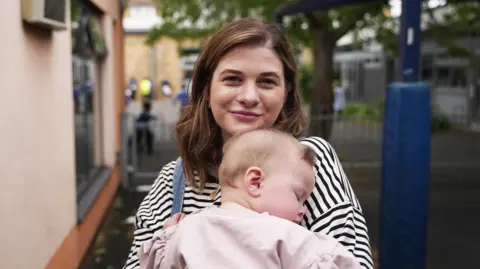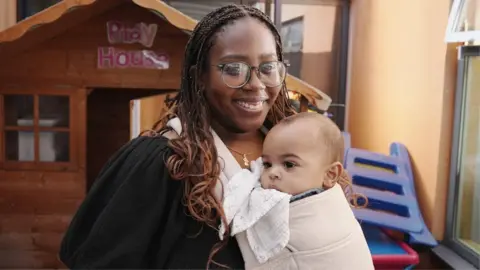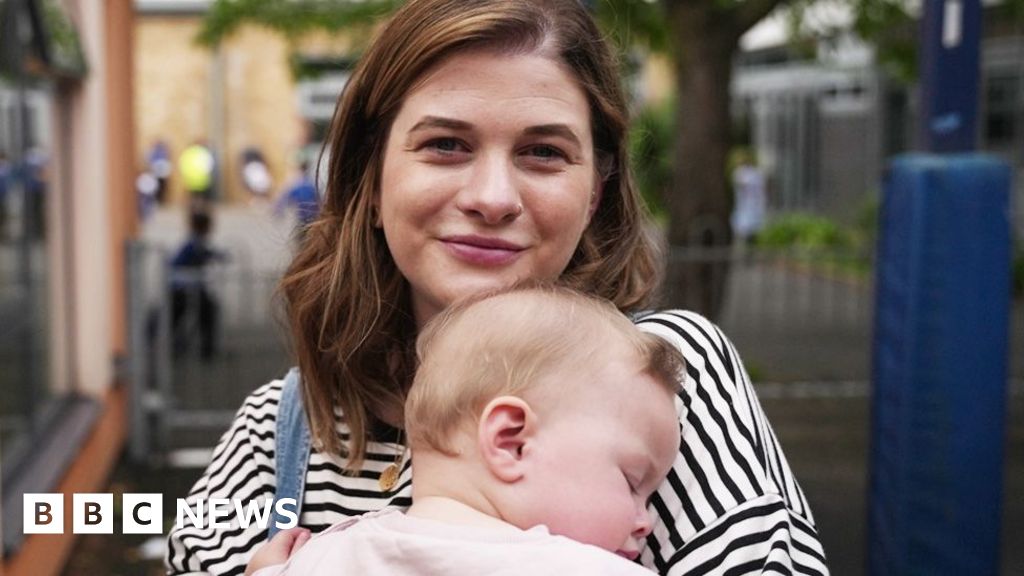Specially designed singing classes are clinically effective at treating mums with postnatal depression, a major three-year study has found. The authors say they could also be cost effective for the NHS at a time when mental health services are under pressure.
At a children’s centre in a housing estate in south London a group of 12 young mums sit in a circle on the floor as their babies cry, crawl and sleep on mats in front of them.
But at this music class there are no bells or tambourines and no Wheels on the Bus or Baby Shark.
Instead, the group work through a mix of lullabies, folk and gospel, switching from Spanish to Congolese to Swahili in rounds of four-part harmonies.
The whole session, from the music selection, to the size of the group, to the set up of the room itself, has been carefully designed to treat the symptoms of postnatal depression.
“I can’t stress enough how much this was a game changer for me,” says Holly, 30, who started the course earlier this year after it was recommended by her care coordinator.
She says she started feeling unwell in her pregnancy after “my hormones, or something, went a bit wrong”.
While those symptoms did start to improve after giving birth to her daughter Ettie, she still felt “vulnerable and very anxious”.
“Being a new mum is one of the loneliest times, because you’re sort of in this insular bubble,” she says.
“And at the very first session here, I walked in and I was like, ‘oh, this is my safe place’. Like, I’m safe here.”

Postnatal depression is a common problem, affecting more than one in 10 women within a year of giving birth, according to the NHS.
Symptoms are wide-ranging but can include persistent sadness or low mood, problems looking after yourself, insomnia and withdrawing from other people.
Melodies for Mums started in 2017 as a free weekly class in Southwark, south London, based on earlier research which suggested group singing could reduce stress and anxiety.
It’s expanded quickly and now runs face-to-face sessions for 400 women a year in five London boroughs and online classes across the UK.
“We know that women experiencing symptoms of postnatal depression can struggle to connect with their peers,” says Yvonne Farquharson, the founder of Breathe Arts Health Research, the non-profit organisation behind the idea.
“So through singing, we’re getting them to really look at each other and make that kind of bond and social connection.”
New mums often join the programme after it’s suggested by their midwife, GP or local authority or find it through social media or word-of-mouth.
There is a screening process to check they will benefit before starting the 10-week course.
A ‘long-lasting’ impact
In 2019 the sessions became part of a study funded by a £2.6m grant from the Wellcome Trust to research how local arts projects might improve physical and mental health at a larger scale.
The results, published this week in the British Journal of Psychiatry, looked at almost 200 mums with postnatal depression over eight months.
The women were split into two groups with one group assigned the singing course and the other offered more typical support like community play classes.
All the mothers reported a reduction in their symptoms by week 10 but that improvement continued in the singing group for another six months beyond the end of the sessions.
“That’s really important because it shows that the singing intervention is not only effective in the immediacy for depression, but it has a long-lasting impact,” says Dr Rebecca Bind, a research associate at Kings College London and one of the study’s lead authors.
Women in the singing group also had a much lower dropout rate and were more likely to say they found it a good match for their needs and easy to use.
The published paper didn’t look specifically at why singing itself seemed to have a beneficial effect. But the researchers have their theories.
“I think part of it was women were in the presence of other mothers who were going through the same kind of experiences, even if they were not necessarily having to talk about it,” says Dr Bind.
“And on top of that, the act of singing itself can have a very relaxing effect.”
A second stage of the analysis has already taken saliva swabs from women to measure levels of the stress hormone cortisol.
Early results suggest that mothers in the singing group saw a “nice steady decline in those levels throughout the intervention period,” according to Carmine Pariante, professor of biological psychiatry at Kings College London.
The music classes also helped mums form a bond with their babies which continued after the end of the course as the songs and music were used at home.

At the children’s centre Jay, holding her young son Ezra, describes postnatal depression as “feeling low when I know I should have been at the happiest point of my life”.
“Just being able to be with people who are also struggling, even though that’s not the focus of the session [is important],” she says.
“You’re there, you’re having a great time and singing, but you know that these people are also experiencing what you’re experiencing.”
Long NHS waiting lists
The organisers stress the singing classes don’t have to replace talking therapies or medication.
But they could be either complimentary or a quicker, easier-to-access alternative for some women, at a time when there can be long waits for NHS mental health services.
Some mothers can wait up to six months for assessment and up to a year for one-to-one treatment, according to a 2024 report by the Maternal Mental Health Alliance.
The Kings College London study found the cost of the music course, at between £126 and £539 per mother and baby depending on how it’s measured, was comparable to alternatives such as educational programmes and considerably lower than the cost of group therapy or home visits.
Yvonne Farquharson at Breathe says the arts organisation has now piloted its first singing sessions aimed at young dads.
And it has also been commissioned by the World Health Organization to train teams to roll out the classes in Denmark, Italy, Romania and other countries.
At the children’s centre in south London the group talk not only about the friendships they have made, but also about the skills they’ve picked up over the 10 weeks.
“I have two very small children so things can get very stressful at home,” says Stella while holding on tight to a wriggling baby Evie.
“I bring the singing back home with me so now I start humming when things get stressful, and I don’t even think about it, it just happens and I can cope.”
Melodies for Mums sample tracks:
- Arrorró mi niño – Spanish lullaby
- Simama Kaa – Swahili folk song
- Bele Mama – Cameroonian folk song
- Yani Yoni Ya Hu Wey Hey – Native American birthing song
- A list of organisations in the UK offering support and information with some of the issues in this story is available at BBC Action Line


